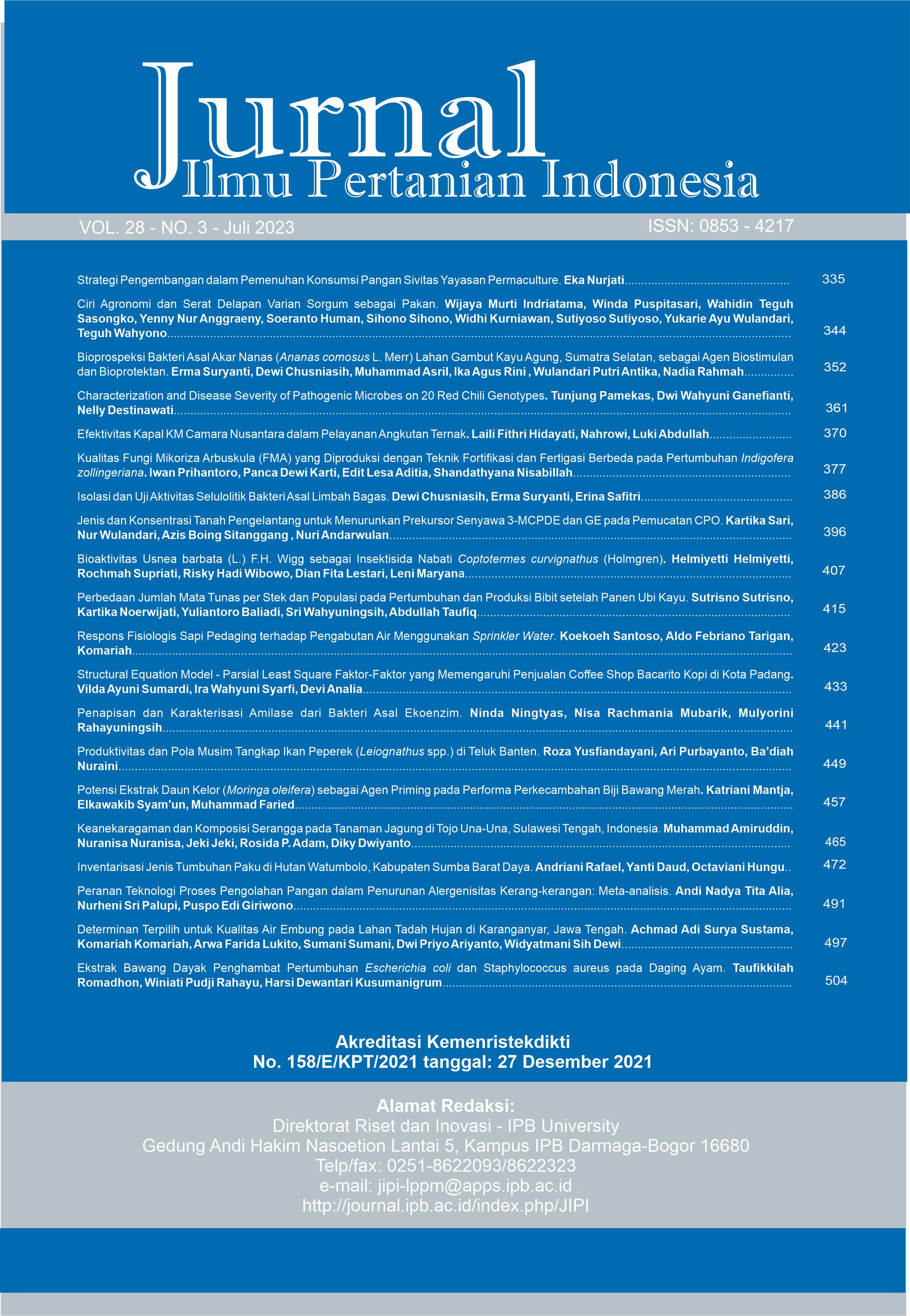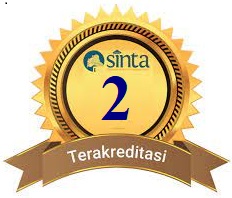Potensi Ekstrak Daun Kelor (Moringa oleifera) sebagai Agen Priming pada Performa Perkecambahan Biji Bawang Merah
Abstract
Moringa leaf extract is a biostimulant containing various phytohormones that can spur plant growth and development. This study aimed to evaluate the potential of Moringa leaf extract as a priming agent on the germination performance of shallot seeds. The experiment began with leaf extract preparation, seed priming, and germination testing. The data obtained were analyzed using ANOVA, and if there was a significant effect, further tested with the BNJ test with α = 0.05. The data were processed using RStudio software version 4.2.1. The results stated that seed priming with leaf extract concentration of 37.5% had the best effect on all germination parameters, including average germination time (2.19 days), final germination percentage (96.53%), seed germination uniformity (95.83%), germination velocity coefficient (45.85), germination rate index (50.48%/day), sprout vigor index I (790.58), sprout vigor index II (31.30), plumula length (6.53 cm), radicle length (1.66 cm), sprout fresh weight (0.32 g), and sprout dry weight (0.0233 g). It was concluded that Moringa leaf extract has the potential as a priming agent for shallot seeds.
Keywords: botanical seed, moringa leaf, priming, shallot
Downloads
References
Abdel-Rahman SSA, Abdel-Kader AAS. 2022. Response of fennel (Foeniculum vulgare, Mill) plants to foliar application of moringa leaf extract and benzyladenine (BA). South African Journal of Botany. 129: 113–122. https://doi.org/ 10.1016/j.sajb.2019.01.037.
Aluko M, Ayodele OJ, Salami AF, Olaleye OE. 2020. Seed priming tehnique as innovation to improve germination in onion (Allium cepa L.). Middle East Journal of Applied Science. 10(1): 7–17.
Balikai MV, Bidarpatil NK, Hosamani J, Biradar MS. 2019. Identification of suitable vigour test for onion (Allium cepa L.) seeds. International Journal of Chemical Studies. 7(60): 553–556.
Basuki. 2009. Analisis kelayakan teknis dan ekonomis teknologi budidaya bawang merah dengan biji botani dan benih umbi tradisional. Jurnal Hortikultura, 19(2): 214–227.
Hala HAE, Nabila AE. 2017. Effect of moringa oleifera leaf extract (MLE) on pepper seed germination, seedlings improvement, growth, fruit yield and its quality. Middle East Journal of Agriculture Research. 6(2): 448–463.
Jardin du Patrcik. 2015. Plant biostimulants: Definition, concept, main categories, and regulation. Scientia Horticulturae. 196: 3–14. doi: https://doi.org/ 10.1016/j.scienta.2015.09.021
Kader MA. 2005. A comparison of seed germinaton calculation formuale and the asssociated interpretation of resulting data. Journal and Proceedings of the Royal Society of New South Wales. 1: 65–75.
Kumar, Sunil, Sudipta B, Anjali A, Sandeep KL, Bhoopal ST. 2021. Identification of the best germination indice represents seed quality status in unaged and aged onion seeds. International Journal of Current Microbiology and Applied Science. 10(2): 76–85. https://doi.org/10.20546/ijcmas.2021. 1002.009
Lazim SK, Ramadhan MN. 2019. Mathematical expression study of some germination parameters and the growth by presowing wheat seeds treatment with a static magnetic field and ammonium molybdate. Plant Archives. 9(2): 2294–2300.
Lutts S, Paolo B, Lukasz W, Szymon KS, Roberta P, Katzarina L, Muriel Q, Malgorzata G. 2016. Seed Priming: New Comprehensive Approaches for an Old Empirical Technique. Dalam: S. Araujo, & A. Balestrazzi (eds). New Challenges in Seed Biology - Basic and Translational Research Driving Seed Technology. IntechOpen (Online). https://doi.org/10.5772/64420
Mashamaite CV, Ngcobo BL, Manyevere A, Bertling I, Fawole OA. 2022. Assessing the usefulness of moringa oleifera leaf extract as a biostimulant to supplement synthetic fertilizers: A review. Plants. 11: 1–17. https://doi.org/10.3390/plants11172214
Mehmood A, Naveed K, Ayub Q, Alamri S, Siddiqui MH, Wu C, Wang D, Saud S, Banout J., Danish S, Datta R, Hammad HM, Nasim W, Mubeen M, Shah F, Fahad S. 2021. Exploring the potential of moringa leaf extract as bio stimulant for improving yield and quality of black cumin oil. Scientific Reports. 11(1): 1–10. https://doi.org/10.1038/s41598-021-03617-w
Pangestuti R, Sulistyaningsih E, Kurniasih B, Murti RH. 2021. Improving seed germination and seedling growth of true seed shallot (TSS) using plant growth regulator seed priming. IOP Conference Series: Earth and Environmental Sience. https:// doi.org/10.1088/1755-1315/883/1/012024
Pawar VA, Laware SL. 2018. Seed priming: A critical review. International Journal of Scientific Research in Biological Sciences. 5(5): 94–101. https:// doi.org/10.26438/ijsrbs/v5i5.94101
Prabhandaru I, Saputro TB. 2017. Respon perkecambahan benih padi (Oryza sativa L.) varietas lokal Sigadis hasil iradiasi sinar gamma. Jurnal Sains dan Seni ITS. 6(2). https:// doi.org/10.12962/j23373520.v6i2.25544
Reed RC, Bradford KJ, Khanday I. 2022. Seed germination and vigor: Ensuring crop sustainability in a changing climate. Heredity. 128: 450–459. https://doi.org/10.1038/s41437-022-00497-2
Rhaman MS, Imran S, Rauf F, Khatun M, Baskin CC, Murata Y, Hasanuzzaman M. 2020. Seed priming with phytohormones: An effective approach for the mitigation of abiotic stress. Plants. 10: 1–17 https://doi.org/10.3390/plants10010037
Yaseen AA, Takacs-Hajos M. 2020. Effect of moringa leaf extract and set size on the bulb weight, diameter, and yield of onions (Allium cepa L.). Acta Agraria Debreceniensis. 2: 127–131. https:// doi.org/10.34101/ACTAAGRAR/2/4105
Yasmeen A, Basra SMA, Wahid A, Nouman W, Rehman H. 2013. Exploring the potential of moringa oleifera leaf extract (MLE) as a seed priming agent in improving wheat performance. Turkish Journal of Botany. 37(3): 512–520. https://doi.org/ 10.3906/bot-1205-19
Yuniati N, Kusumiyati, Mubarok S, Nurhadi B. 2020. The role of moringa leaf extract as a plant biostimulant in improving the quality of agricultural products. Plants. 11:1–13. https://doi.org/ 10.3390/plants11172186
This journal is published under the terms of the Creative Commons Attribution-NonCommercial 4.0 International License. Authors who publish with this journal agree to the following terms: Authors retain copyright and grant the journal right of first publication with the work simultaneously licensed under a Creative Commons Attribution-NonCommercial 4.0 International License. Attribution — You must give appropriate credit, provide a link to the license, and indicate if changes were made. You may do so in any reasonable manner, but not in any way that suggests the licensor endorses you or your use. NonCommercial — You may not use the material for commercial purposes.























